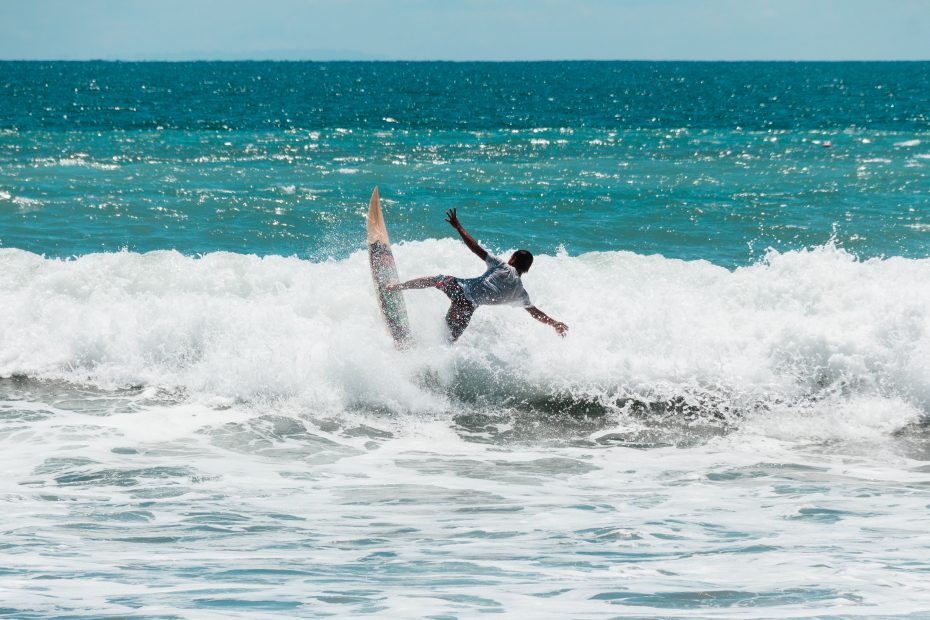Surfing is a fun water sport that allows one to glide over the waves and feel the sensation of flying above the ocean waves. For those of you who are newcomers trying to try this exciting experience, you need to master the basics of surfing. This article intends to provide you with guidelines and surfing techniques that you can try as a beginner.
1. Choose a ‘Friendly’ Beach for Beginner Surfers
When you’re just starting to surf, it’s important that you choose a beach with gentle, rolling waves that are suitable for beginners, so you can acclimate to the waves first. Avoid beaches with strong, fast and furious waves, as they are dangerous for inexperienced surfers. Look for a location with gentle, friendly waves, as this provides an ideal learning environment. The beaches that you can try to learn to surf in Bali yourself are Kuta, Medewi, Balangan, or other beaches.
2. Use Proper Surf Equipment
Investing in the right surf equipment is very important for beginners to get the maximum surfing experience. Start with a long surfboard or soft-top surfboard, as they offer greater stability and buoyancy, making it easier for you to catch waves. In addition, use a safety rope connected to your board to prevent the board from being carried away and ensure your safety in the water, so you don’t get swept away by the waves when you fall. Don’t forget to use a wetsuit that is comfortable and according to the water temperature to keep you warm.
3. Participate in Surfing Training for Beginners
Enrolling in a surfing course or taking lessons from a qualified instructor is highly recommended for beginners so that you have an idea and basic knowledge about surfing. Guidance from a professional will help you understand the basics of surfing, such as rowing technique, wave selection, and how to maintain balance while standing on the board. Learning from experienced instructors will improve your skills and help you progress faster. You can take part in the training on SurfingInBali.com!
4. Paddle Exercises and Popping Ups
Paddle is a basic skill in surfing that you must know. Lie back on the board and practice rowing with your arms, focusing on building strength and endurance. The oars help you catch waves and position yourself properly in the lineup. Apart from that, also practice popping up movements, namely moving from a lying position to a standing position on a board. This movement should be quick and controlled, using your arms to push your upper body off the board while bringing your feet under your body.
5. Observe and Respect Surf Etiquette
Understanding and respecting surfing etiquette is essential to the safety and satisfaction of all surfers. Before entering the water, watch how experienced surfers behave and follow their example. Some basic etiquette includes waiting your turn, not getting into other people’s waves, and avoiding collisions with other surfers. Being considerate and respectful in the lineup will create a positive surf community.
6. Start with Small Waves
As a beginner, it’s best to start with small waves that you can handle. These waves are less intimidating and provide a controlled environment in which to practice your skills. Focus on improving your balance and getting comfortable on the board before moving on to bigger waves. Building a solid foundation will help you face more challenging conditions in the future.
7. Aware of Safety at Sea
Understanding and respecting safety at sea is very important in surfing. Before entering the water, check the local surf conditions, tides and weather forecast. Watch out for rip currents, which can quickly pull you away from shore. If caught in a reverse current, stay calm and swim parallel to the shore until you are out of the current. Also, always surf according to your skill level and avoid taking unnecessary risks.
Conclusion
Surfing is an exciting sport that offers excitement and a strong connection to the ocean. By following these tips, beginners can start their surfing journey with confidence. Remember to choose the right wave, get the right equipment, take lessons, practice basic skills, respect surf etiquette, start out in smaller waves, and put safety at sea first. Accept the learning process, have fun, and enjoy the beautiful waves in surfing.

